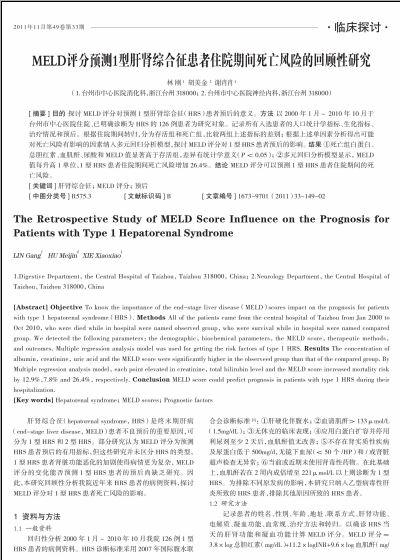MELD评分预测1型肝肾综合征患者住院期间死亡风险的回顾性研究(1)
 |
| 第1页 |
参见附件(1824KB,2页)。
[摘要] 目的 探讨MELD评分对预测1型肝肾综合征(HRS)患者预后的意义。方法 以2000年1月~2010年10月于台州市中心医院住院、已明确诊断为HRS的126例患者为研究对象。记录所有入选患者的人口统计学指标、生化指标、治疗情况和预后。根据住院期间转归,分为存活组和死亡组,比较两组上述指标的差别;根据上述单因素分析得出可能对死亡风险有影响的因素纳入多元回归分析模型,探讨MELD评分对1型HRS患者预后的影响。结果 ①死亡组白蛋白、总胆红素、血肌酐、尿酸和MELD值显著高于存活组,差异有统计学意义(P<0.05);②多元回归分析模型显示,MELD值每升高1单位,1型HRS患者住院期间死亡风险增加26.4%。结论 MELD评分可以预测1型HRS患者住院期间的死亡风险。
[关键词] 肝肾综合征;MELD评分;预后
[中图分类号] R575.3 [文献标识码] B [文章编号] 1673-9701(2011)33-149-02
The Retrospective Study of MELD Score Influence on the Prognosis for Patients with Type 1 Hepatorenal Syndrome
LIN Gang1 HU Meijin2 XIE Xiaoxiao1
1.Digestive Department,the Central Hospital of Taizhou,Taizhou 318000,China;2.Neurology Department,the Central Hospital of Taizhou,Taizhou 318000,China
[Abstract] Objective To know the importance of the end-stage liver disease (MELD)scores impact on the prognosis for patients with type 1 hepatorenal syndrome (HRS). Methods All of the patients came from the central hospital of Taizhou from Jan 2000 to Oct 2010,who were died while in hospital were named observed group,who were survival while in hospital were named compared group. We detected the following parameters:the demographic,biochemical parameters,the MELD score,therapeutic methods,and outcomes. Multiple regression analysis model was used for getting the risk factors of type 1 HRS. Results The concentration of albumin,creatinine,uric acid and the MELD score were significantly higher in the observeed group than that of the compared group. By Multiple regression analysis model,each point elevated in creatinine,total bilirubin level and the MELD score increased mortality risk by 12.9%,7.8% and 26.4%,respectively. Conclusion MELD score could predict prognosis in patients with type 1 HRS during their hospitalization.
[Key words] Hepatorenal syndrome;MELD scores;Prognostic factors
肝肾综合征(hepatorenal syndrome,HRS)是终末期肝病(end-stage liver disease,MELD)患者不良预后的重要原因,可分为1型HRS和2型HRS。部分研究认为MELD评分为预测HRS患者预后的有用指标,但这些研究并未区分HRS的类型,1型HRS患者肾脏功能恶化的加剧使得病情更为复杂,MELD评分的变化能否预测1型HRS患者的预后尚缺乏研究。因此,本研究回顾性分析我院近年来HRS患者的病例资料,探讨MELD评分对1型HRS患者死亡风险的影响 ......
您现在查看是摘要介绍页,详见PDF附件(1824KB,2页)。